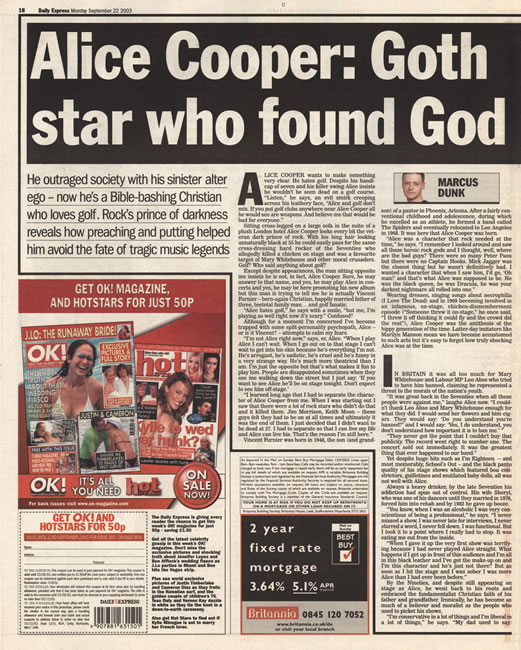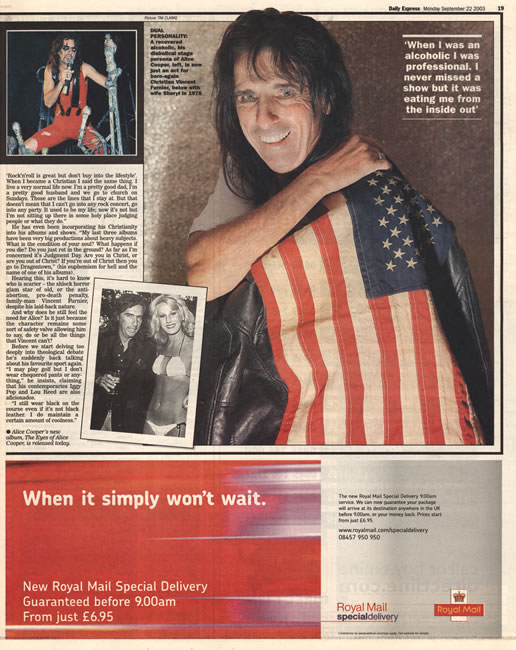Article Database
Alice Cooper: Goth star who found God
He outraged society with his sinister alter ego – now he's a Bible-bashing Christian who loves gold. Rock's prince of darkness reveals how preaching and putting helped him avoid the fate of tragic music legends.
Alice Cooper wants to make something very clear. He hates golf. Despite his handicap of seven and his killer swing Alice insists he wouldn't be seen dead on a golf course. "Listen," he says, an evil smirk creeping across his leathery face, "Alice and golf don't mix. If you put golf clucks anywhere near Alice Cooper all he would see are weapons. And believe me that would be bad for everyone."
Sitting cross-legged on a large sofa in the suite of a plush London hotel Alice Cooper looks every bit the veteran dark prince of rock. With his long hair looking unnaturally black at 55 he could easily pass for the same cross-dressing hard rocker of the Seventies who allegedly killed a chicken on stage and was a favourite target of Mary Whitehouse and other moral crusaders. Golf? Who said anything about golf?
Except despite appearances, the man sitting opposite me insists he Is not, in fact, Alice Cooper. Sure, he may answer to that name, and yes, he may play Alice in concerts and yes, he may be here promoting his new album but this man is trying to tell me he is actually Vincent Furnier – born- again Christian, happily married father of three, teetotal family man . . . and golf maniac.
"Alice hates golf," he says with a smile, "but me, I'm playing so well right now it's scary." Confused?
Although for a moment I'm concerned I've become trapped with some split-personality psychopath, Alice – or is it Vincent? – attempts to calm my fears.
"I'm not Alice right now," says, er, Alice. "When I play Alice I can't wait. When I go out on to that stage I can't wait to get into his skin because he's everything I'm not. He's arrogant, he's sadistic, he's cruel and he's funny in a very strange way. He's much more theatrical than I am. I'm just the opposite but that's what makes it fun to play him. People are disappointed sometimes when they see me walking down the street but I just say: 'If you want to see Alice he'll be onstage tonight. Don't expect to see him off-stage.'
"I learned long ago that I had to separate the character of Alice Cooper from me. When I was starting out I saw that there were a lot of rock stars who didn't do that and it killed them. Jim Morrison, Keith Moon – these guys felt they had to be on at all times and ultimately it was the end of them. I just decided that I didn't want to be dead at 27. I had to separate so that I can live my life and Alice can live his. That's the reason I'm still here."
Vincent Furnier was born in 1948, the son (and grandson) of a pastor in Phoenix, Arizona. After a fairly conventional childhood and adolescence, during which he excelled as an athlete, he formed a band called The Spiders and eventually relocated to Los Angeles in 1968. It was here that Alice Cooper was born.
"Alice was a character that rock needed at the time," he says. "I remember I looked around and saw all these heroic rock gods and I thought, well, where are the bad guys? There were so many Peter Pans but there were no Captain Hooks. Mick Jagger was the closest thing but he wasn't definitively bad. I wanted a character that when I saw him, I'd go, 'Oh man!' and that's what Alice was supposed to be. He was black queen, he was Dracula, he was your darkest nightmare all rolled into one."
Wearing dressing, singing songs about necrophilia (I Love The Dead) an din 1969 becoming involved in an infamous, on-stage, chicken-dismemberment episode ("Someone threw it on-stage," he once said, "I threw it off thinking it could fly and the crowd did the rest"), Alice Cooper was the antithesis of the hippy generation of the time. Latter-day imitators like Marilyn Manson mean we have become accustomed to such acts but it's easy to forget how truly shocking Alice was at the time.
In Britain it was all too much for Mary Whitehouse and Labour MP Leo Abse who tried to have him banned, claiming he represented a threat to the morals of the nation's youth.
"It was great back in the Seventies when all these people were against me," laughs Alice now. "I couldn't thank Leo Abse and Mary Whitehouse enough for what they did. I would send her flowers and him cigars. They would say: ' Do you understand you're banned?' and I would say: 'Yes, I do understand, you don't understand how important it is to ban me.' "
"They never got the point that I couldn't buy that kind of publicity. The record went right to number one. The concert sold out immediately. It was the greatest thing that ever happened to our band."
Yet despite huge hits such as I'm Eighteen – and most memorably, School's Out – and the black panto quality of his stage shows which featured boa constrictors, guillotines and mutilated baby dolls, all was not well with Alice.
Always a heavy drinker, by the late Seventies his addiction had spun out of control. His wife Sheryl, who was once of his dancers until they married in 1976, forced him into rehab and by 1982 he gave up booze.
"You know, when I was an alcoholic I was very conscientious of being a professional," he says. "I never missed a show, I was never late for interviews, I never slurred a word, I never fell down. I was functional. But I took it to a point where I really had to stop. It was eating me out from the inside.
"When I gave it up the very first show was terrifying because I had never played Alice straight. What happens if I get up in front of this audience and I'm all in this black leather and I've got the make-up on and I'm this character and he's just not there? But as soon as I hit the stage and I was sober I was more Alice than I had ever been before."
By the Nineties, and despite still appearing on stage as Alice, he went back to his roots and embraced the fundamentalist Christian faith of his father and grandfather. Ironically, he has become as much of a believer and moralist as the people who used to picket his shows.
"I'm conservative in a lot of things and I'm liberal in a lot of things," he says. "My dad used to say: 'Rock 'n' roll is great but don't buy into the lifestyle'. When I became a Christian I said the same thing. I live a very normal life now. I'm a pretty good dad, I'm a pretty good husband and we go to church on Sundays. Those are the lines that I stay at. But that doesn't' mean that I can't go into any rock concert, go into any party. It used to be my life; now it's not but I'm not sitting up there in some holy place judging people or what they do."
He has even been incorporating his Christianity into his albums and shows. "My last three albums have been very big productions about heavy subjects. What is the condition of your soul? What happens if you die? Do you just rot in the ground? As far as I'm concerned it's Judgment Day. Are you in Christ, or are you out of Christ? If you're out of Christ when you go to Dragontown." (his euphemism for hell and the name of one of his albums).
Hearing this, it's hard to know who is scarier – the schlock horror glam star of old, or the anti-abortion, pro-death penalty, family-man Vincent Furnier, despite his laid-back nature.
And why does he still feel the need for Alice? Is it just because the character remains some sort of safety valve allowing him to say, do or be all the things that Vincent can't?
Before we start delving too deeply into theological debate he's suddenly back talking about this favourite sport again. "I may play golf but I don't wear chequered pants or anything," he insists, claiming that his contemporaries Iggy Pop and Lou Reed are also aficionados.
"I still wear black on the course even if it's not black leather. I do maintain a certain amount of coolness."
Alice Cooper's new album, The Eyes of Alice Cooper, is released today.
(Published in the Daily Express on Monday 22nd September 2003 in the UK)





